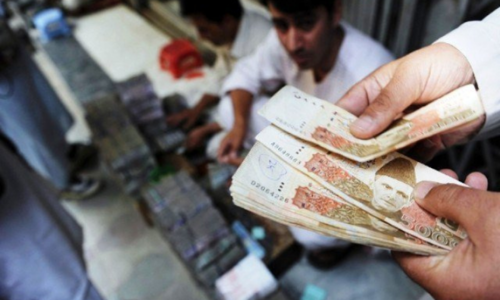LAST week, the FBR crossed what Prime Minister Imran Khan called a historic milestone by collecting more than Rs4tr in taxes (in the 11-month period from July to May) for the first time in a given fiscal year. The reported figure is around 18pc more than last year’s Rs3.54tr. The increased tax collection is being showcased by the government as evidence of a recovering economy, which continues to feel the effects of the ongoing pandemic. Notwithstanding the improvement in tax collection, which was stuck at around Rs3.8tr for the last three years, we still lag behind the revised tax target of about Rs4.7tr. That should be a cause of concern for the government since the National Accounts Committee now estimates the economy to expand by 3.94pc during this fiscal year against the original projection of 2.1pc. Though officials insist that the (revised) tax target will be achieved, their claim does not appear very plausible.
A break-up of the taxes collected by the FBR shows that sales tax grew by a hefty 28.3pc in the first 11 months of the ongoing fiscal because of the rise in fuel prices, increase in imports, and better economic conditions. Collection of duties by Customs posted an increase of 18.6pc while the federal excise duty was up by 11.55pc. However, income tax revenues have grown by just over 10pc in spite of a significantly large number of presumptive and withholding taxes. For next year, the IMF wants tax revenues to be closer to Rs6tr. With the economy projected to increase by 4.8pc, the collection of additional tax revenue will be difficult without imposing new taxes and cancelling several exemptions. This is why Finance Minister Shaukat Tarin, is trying to convince the IMF to lower its suggested target to nearly Rs5.5tr to make it realistic and achievable.
Read: Is the economy recovering?
The new finance minister has time and again underscored the need for boosting tax revenues, saying if Pakistan were to sustainably grow at 7pc to create jobs and alleviate poverty it would have to drastically raise its tax-to-GDP ratio. Indeed, the current ratio of around 10pc, one of the lowest in the region and in the world, is at the heart of the nation’s economic and financial woes. Without raising the tax ratio to a decent 15pc in the next few years, it would not be possible to bridge the fiscal deficit, offload debt or employ fiscal policy tools to push economic growth. Any serious effort to raise taxes anticipates wide-ranging reforms, especially improvements in the direct tax regime for making it robust and people-friendly, to broaden the tax net as well as create close linkages between the nation’s tax policy and growth objectives. Ever since he was given the job, Mr Tarin has been pledging to move in this direction in the next budget. Will he succeed in delivering on his promises? Only time will tell.
Published in Dawn, June 1st, 2021












































